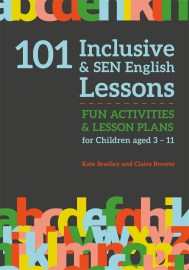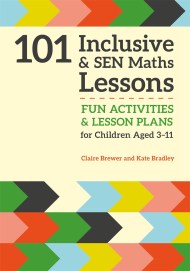101 Inclusive and SEN Science and Computing Lessons
On sale
19th April 2018
Price: £16.99
Create an inclusive classroom with these fun and accessible activities for science and computing lessons. Each lesson is tailored to objectives for children working below National Curriculum levels and includes a learning objective, the resources needed, the main activity, a plenary and a consolidation activity to support children’s understanding and engagement.
When working with children, and especially those with SEN, lessons need to meet their interests as well as their needs by containing visual stimulus and promoting fine and gross motor skills. The activities in this book have been specifically designed with this in mind. Straightforward and practical, it offers 101 creative classroom activities for teaching Science and Computing to pupils who are working below national curriculum levels, as well as mapping the range of additional skills they will acquire.
When working with children, and especially those with SEN, lessons need to meet their interests as well as their needs by containing visual stimulus and promoting fine and gross motor skills. The activities in this book have been specifically designed with this in mind. Straightforward and practical, it offers 101 creative classroom activities for teaching Science and Computing to pupils who are working below national curriculum levels, as well as mapping the range of additional skills they will acquire.
Newsletter Signup
By clicking ‘Sign Up,’ I acknowledge that I have read and agree to Hachette Book Group’s Privacy Policy and Terms of Use
Reviews
Kate and Claire are experienced and creative practitioners, ably supporting learners with SEND in both mainstream and specialist classrooms. In 101 Inclusive and SEN Science and Computing Lessons, they have created yet another valuable resource. It translates and distills their extensive specialist knowledge and compelling and creative approach into inclusive, fun and engaging activities. Staff will be able to dip in and out of this book to create accessible and irresistible Science and Computing activities, whether or not they have specialist knowledge themselves.
A great resource for SEN teachers. Well-organised, comprehensive coverage of key science concepts, with a clear focus on working scientifically skills. The lessons will inspire genuine engagement with phenomena and ideas.
101 Inclusive and SEN Science and Computing Lessons provides teachers with a range of engaging, accessible lessons that highlights the importance of key concept exploration together with the introduction of basic scientific vocabulary. The realistic resource requirement for each lesson highlights how 'Supermarket Science' is vital for educational establishments with a limited Science budget. The authors have a 'real' understanding of how SEN pupils learn by emphasising the importance of visual and kinaesthetic activities. In addition, the lessons are functional, promoting independence and providing our pupils with the opportunity to apply the Science they have experienced to 'Everyday Life' at home.






